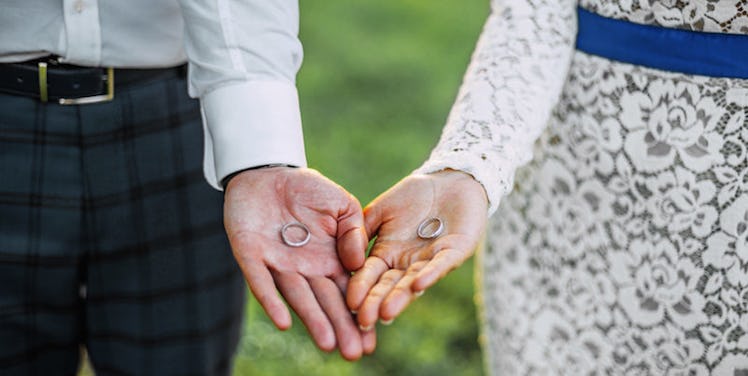
Why Women Believe They Must Choose Between Their Careers And Marriage
I am 22 years old, and a couple months ago, a woman I know got engaged. She is also 22 years old.
I remember texting my best friend the Instagram announcement that I, naturally, screenshotted in hopes to better judge the rock flashing on her ring finger.
“Wut. We R 22. IDGI,” I said, along with a tasteful amount of bridal emojis.
Holy sh*t. This woman is my age, and she’s committing to someone for the rest of her life. I can barely commit to a pair of booties while online shopping. What the hell is going on?
It was shocking, but if we’re being completely honest, it wasn’t too crazy. They’ve dated for years; she graduated from college, and they both have their sh*t together. Plus, they’re happy and in love, so why not?
My own mom was married for a year by her 22nd birthday. Granted, that was 1987, but still, more insane things have happened than 22-year-old brides. (Remember when Americans once had the option to purchase purple or green ketchup?)
After I sent my text, I went about my business, all the while fantasizing about being engaged at 22. Business, of course, is defined as binge-watching "Everybody Loves Raymond" on Netflix and contemplating ordering pizza for the third time that week.
I also distinctly remember procrastinating folding my laundry, after drying it for the sixth time that day. It was then I realized I am not wifey material, and my 22 is likely very different from this bride-to-be’s 22.
But still, it’s 2-2.
Sometime during my super productive afternoon, my bestie replied to my text with her own variation of “OMGOMGOMG” and bridal emojis. Just as I predicted, her shock mirrored mine, but for a very different reason.
Though I am sure age was a contributing factor, she said what shocked her the most was she’d always thought this woman was a driven, career-oriented kind of person. But now, she was getting married.
At first, I agreed with her because despite knowing this princess-bride was — and still is — totally in love with her man, I have always viewed this woman as a trailblazer in the business world.
I believed the professional aspect of her life was far more important than the personal one.
I guess I saw her as a true “modern woman,” not likely to set a wedding date before her late-20s. I might have even guessed she would wait until her early-40s to procreate, only after she’d traveled the world in its entirety, exceeded expectations in her career and “found herself” on a deeply spiritual level somewhere in East Asia.
But, no, she’s getting married.
So, as much as I hate to admit this, in my mind, there was basically no trailblazing, traveling or spiritual awakenings in her future. On some subconscious level, I saw this as an end of opportunities for her.
The fact that my mind immediately equated engagement with a stunted life for a woman really pissed me off. I’m a proud feminist, and that means there is no room for irrational judgment of other people, especially women. But that was exactly what I was doing.
Then I got to thinking: Why does a woman’s relationship status make her any “less” of a career woman?
When a man pops the question and looks to settle down, most people don’t think any less of him for it. If anything, really, we see that as a sign of maturity and direction. He’s getting a pat on the back and celebratory round at his favorite post-work watering hole.
Sure, his friends might bust his balls about not being able to chase tail anymore, but are they worried about his career imploding? No, they’re not.
In many careers, being a married man is an advantage. Just think about in terms of politics: Apparently, a married man appears “more in tune with family values” and “more trustworthy.”
Marriage might mean a career edge for a man, and it also could signify his ability to be emotionally, socially and physically capable. There are little-to-no instances I can think of where society would view a married man as someone who gave up on his career or lost his desire for professional success.
So, really, I wonder, why do we feel as though women lose their work-place drive or determination, simply because they are choosing to build lives with people they love?
Why is there such a deep divide between women of different marital standings? Why is it the only woman who can be a powerhouse is the woman standing alone? Does that really seem fair?
Why should a woman only be admired if she is dominating her career without a man (or woman) to come home to at the end of the day? Why can’t a woman be considered "modern" because of her choice to get married before she’s 35?
Why would a married woman be incapable of finding herself, simply because she’s found someone she loves? Why are women taking the time to label other women? Why are we creating separations and niches? Why can’t women just be women?
I don’t have the answers to these questions, and I doubt any of you do, either. But, I think it’s important we ask them. It’s important not to let our emotions or our irrational thoughts create doubts about others, simply because they make choices different from our own.
So what if she’s 22? So what if she’s getting married? I have a feeling she’s about to take her career to the top, and she'll do it all while having blissful newlywed sex at the end (or beginning) of each day.
I guess the only question left is, "Where do I sign up for that?"